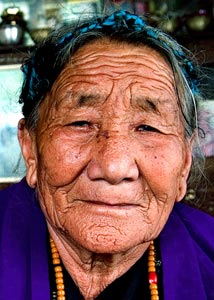Name: Wangmo
(Alias: No)
Gender: Female
Interview Age: 78
Date of Birth: 1929
Birthplace: Toe Dhingri, Utsang, Tibet
Year Left Tibet: 1962
Profession: Agriculture
Monk/Nun: No
Political Prisoner: No

Interview No.: 67
Date: 2007-07-04
Language: Tibetan
Location: Lugsung Samdupling Settlement, Bylakuppe, Karnataka, India
Categories: Chinese Invasion and Occupation
Keywords: brutality/torture, childhood memories, Chinese -- oppression under, Chinese rule -- life under, clothing/weaving, escape experiences, forced labor, monasteries -- destruction of , songs/opera, thamzing/struggle sessions, Utsang
Summary:
A native of Dhingri, Wangmo's parents died when she was a teenager and she wove carpets and blankets, until she married at age 18 or 19. She moved to her husband, Wangla's, his village, Lhatse, where he was a lhamo 'opera' performer. Her husband also participates in the interview and describes lhamo and its significance as an integral part of Tibetan culture and tradition.
Wangmo recalls the misery she endured trying to care for her four children after the Chinese forcibly took her husband to Lhasa to teach them Tibetan opera. She describes thamzing 'struggle sessions' in her village where monks and wealthy landowners were beaten by poor villagers at the coercion of the Chinese. She recounts that some people were shot, while others became permanently disabled due to severe beatings. Unable to endure these abuses, some people committed suicide either by jumping into rivers or by hanging themselves.
Wangmo also witnessed the destruction of many monasteries in her region. The family's sufferings continued even after their escape from Tibet. They were put in detention and interrogated daily in Gangtok, Sikkim, and later in Kalimpong by Indian authorities, who were suspicious of the refugees and made them explain why and how they had escaped.
Interview Team:
- Martin Newman (Interviewer)
- Lhakpa Tsering (Interpreter)
- Jeff Lodas (Videographer)

